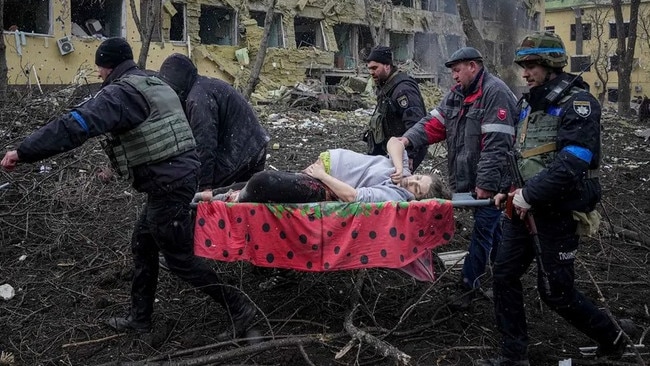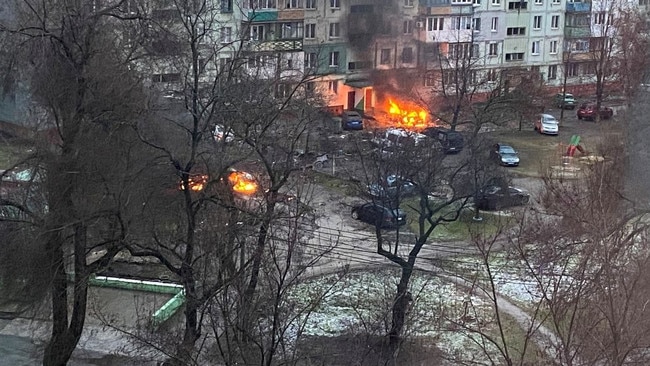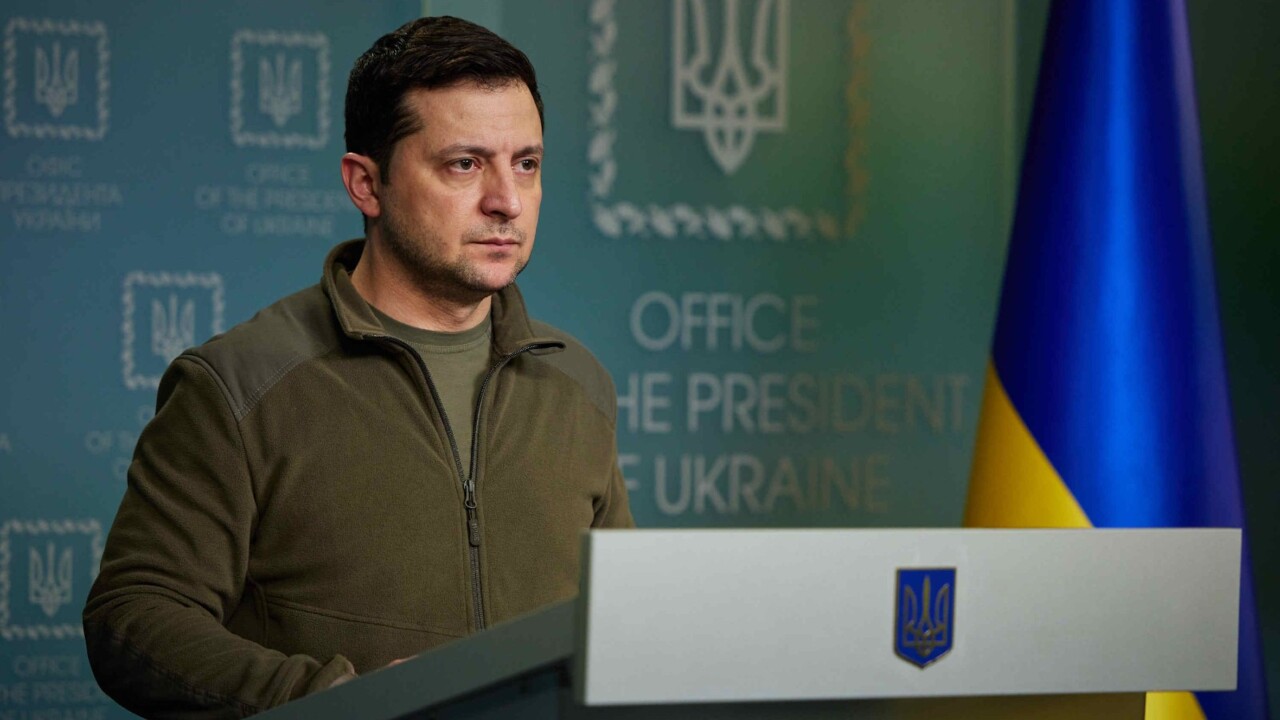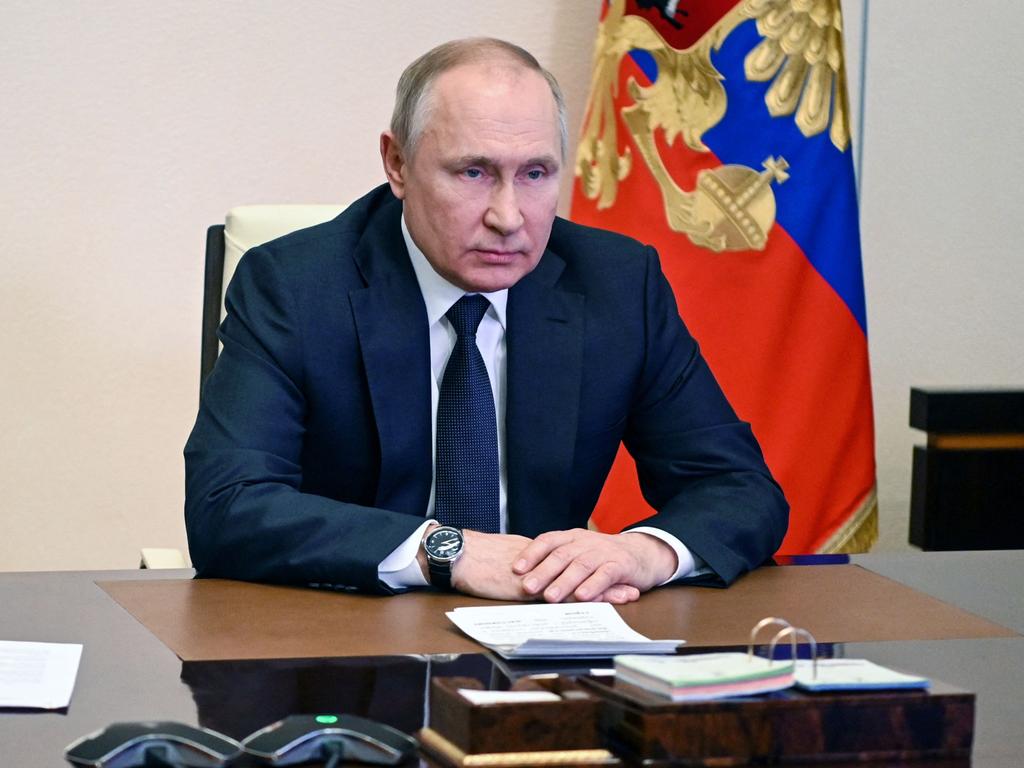Ukraine invasion: No food, water or electricity: now Russians go a ‘colossal’ step further
Vladimir Putin’s grotesque war strategy in Ukraine can be seen in the devastating tactics he has adopted in Mariupol.

Vladimir Putin’s grotesque war strategy in Ukraine can be seen in the devastating tactics he has adopted in Mariupol, a city of half a million people on the Black Sea, the latest horror of which was a “colossal” attack on a maternity hospital.
On Wednesday Russian rockets devastated the maternity hospital in Mariupol, leaving babies and mothers, many of whom had been sheltering in the basement, buried in the rubble. Footage emerging from the city shows every window of the hospital was blown out. Three people were killed, including a young girl, and 17 wounded. It is unknown whether the Russians had used a thermobaric bomb to inflict so much damage.
Horrifying attack on Mariupol. Children's hospital and maternity hospital targeted by Russian strikes. Many losses. The city is completely surrounded. There’s no electricity, water and gas. Russia refuses to provide green corridor. City is facing humanitarian catastrophe. pic.twitter.com/YwhvABuVVZ
— Maria Avdeeva (@maria_avdv) March 9, 2022
Ukrainian president Volodomyr Zelensky said the attack was an “atrocity.”
He pleaded: “Direct strike of Russian troops at the maternity hospital. People, children are under the wreckage. Atrocity! How much longer will the world be an accomplice ignoring terror? Close the sky right now! Stop the killings! You have power but you seem to be losing humanity”.
The Ukrainian foreign minister Dmytro Kuleba had earlier pleaded to the Kremlin to allow a humanitarian corridor so that trapped residents could leave from the city, saying 3000 babies were currently without food or medicines. But for the fourth time the promised window of ceasefire in the area failed to materialise.
Mariupol is where Putin is deploying the eerily similar barbaric military action he carried out in Grozny, Chechnya nearly a quarter of a century ago: surround a city, mine the perimeters with butterfly mines and station sniper groups to mow down anyone trying to escape, then bomb the place repeatedly so entire districts are razed and the surviving population is utterly demoralised.
Mariupol’s nightmare started on March 1, some three days after the invasion began when Russian troops had made their way north from their Crimea staging post and south from the Donetsk region to encircle the city, which is a strategic port.
The Left Bank in Mariupol was the first to be hit. Residents were evacuated to the city centre only to run into a Russian sniper team, situated on a crucial bridge link, a problem until they were eliminated.
About half of the population had fled by this time, but those who were too scared, too ill, or stood to fight for the city, have now spent ten long days and nights huddled in basements. Officials estimate 200,000 people are now in the city with no heating, no electricity and no communications.

The gas was severed four days ago leaving the residents without any warmth in subzero conditions. The snow that fell this week has been a life saver, for it has given the residents some water to drink. The world heard the horrific story of the six year old girl, found in rubble of a destroyed building next to her dead mother who died of dehydration.
Now there is no food in stores, the “social bread’’ factory which was set up in the first days of the war is without any flour. The city’s residents, terrified and uncertain what is happening around them, are surviving on their precious stored supplies.
The Azoz battalion has positioned itself to stop the Russians from coming into the city, but the commander said on a social media post this week: “the enemies are breaking the rules of war by shelling civilians and breaking their infrastructure. There is a critical lack of food and water, gas and electricity. The innocent people in Mariupol are almost starving. The humanitarian corridors failed because the assembly points were shelled actively.” He called for a no fly-zone over Ukraine, warning: “a delay will cost more and more lives’’.

On Tuesday a convoy of eight trucks and 30 buses laden with 90 tonnes of medicines, water and cereals headed to the city, but it was shelled upon by Russian forces.
The evacuation assembly point organised by city officials was also attacked, preventing the opening of a much needed humanitarian corridor. This week four times the escape route for locals was promised, and four times it didn’t happen. The psychological devastation on people who are cold, tired and hungry is immense.
President Zelensky said: “They fire at evacuation routes. They block the delivery of essential products and medicines to people. What do they want? They want Ukrainians to take it from the hands of the invaders. This is torture.”
Overhead Russia has dropped plane loads of butterfly mines – small and made of green plastic which often attracts inquisitive children. They are designed to blow off a leg or an arm, and so preoccupy defending forces to look after the injured.
Diana Berkin fled the city five days ago. When she was there the situation was dire, but she knows it is much worse now. “Last week there was no communication, no mobile, a total information blackness, you only hear the shelling, it is constant, brutal and non stop,” she told Ukrainian television.
She said she would listen to the sound of the bombs to determine the direction they were headed, knowing if it hit to the right it was where her sister lives, on the left where other relatives were bunkered down. A week ago she said people would only go out to line up for drinking water or food but that doesn’t happen any more because there are no supplies. She has had little word on what is happening inside the city at the moment, but she knows it is
a ”survival horror’’ and she fears for her family. “How long can people go on?’’ she says.








To join the conversation, please log in. Don't have an account? Register
Join the conversation, you are commenting as Logout